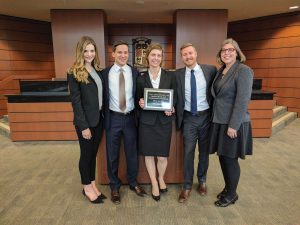Standing still in your legal career isn’t really an option anymore. The profession is changing fast and those who don’t adapt risk being left behind. For mid-career attorneys looking to evolve, expand or retool, the LL.M. is becoming an increasingly attractive path forward.
Long considered the domain of foreign-trained lawyers looking to sit for a U.S. bar exam, the LL.M. has grown into something more. Today, it serves a very different purpose for many U.S. attorneys: advancement, reinvention and new opportunity. Whether it’s diving deeper into tax, pivoting into cybersecurity, or exploring a niche like health law or arbitration, the right LL.M. program can offer a direct line to what’s next.
“It’s like adding tools to your tool belt,” said Robert Dormady, assistant dean of graduate programs at Sandra Day O’Connor College of Law at Arizona State University.
Many lawyers build a strong foundation over years in practice — litigation, client strategy, negotiation — but realize they need sharper or more specialized skills to move up, shift gears or stay competitive. A targeted LL.M. gives them exactly that: a credential that adds credibility, deepens expertise and opens doors.
LL.M. Honor Roll
So how do you choose an LL.M. program?
Attorneys suggest that prospective students look at a school’s faculty. You will spend more time with a smaller number of professors than you did as a J.D. student.
How many curricular offerings are there in your field of study? Are there hands-on practice opportunities? Externships and clinics can help develop your skills. Does the career placement office support LL.M. students? A dedicated career counselor can help you land a job in your specialty.
We asked law schools these questions and more to determine the programs that offer the most services and curricular offerings. We recognize the leaders on our Honor Roll.
Here’s the methodology on how we computed our Honor Roll: For academics, we look at the number of courses offered (15%) and the number of professors (15%). Career opportunities consist of networking opportunities (8%), recruitment programs (8%) and whether there is a dedicated career counselor (14%). Practical training includes whether there is a live client opportunity (7%) and externships (4%). Student offerings include simulation courses (4%), journal participation (4%), moot court participation (4%) and student group options (7%). We reserve 10% for other.
Honoree LL.M. programs needed to score a 74 out of 100 to be recognized.
Our Honor Roll is designed to be one tool to help you determine where to apply. But it doesn’t mean that other LL.M. programs are not up to snuff. Some offer prestige and others are solid programs, even if they don’t offer the full breadth of services that honor roll programs provide.
We invite you to delve into the details for every program in our directory and assess each school individually at: llmdirectory.NationalJurist.com.
LL.M. Program Honor Roll
International Law
Technology, global trade and the lingering effects of the pandemic have transformed the way legal systems interact. As businesses and governments become more globally connected, the demand for lawyers who understand international law and dispute resolution is growing.
Attorneys in this space help companies manage cross-border transactions, resolve international disputes and navigate regulatory compliance in multiple jurisdictions. That requires not only a solid legal foundation, but also cultural fluency, practical skills and deep knowledge of how different systems approach conflict resolution.
Most international lawyers work in large firms, multinational corporations or government agencies. But landing those jobs, especially right after graduation, can be tough. That’s one reason many lawyers pursue an LL.M. in international law or dispute resolution to strengthen their credentials and expand their network.
At Pepperdine University Rick J. Caruso School of Law, students come for the view and stay for the top-ranked education. Located in Malibu, California, Pepperdine is home to the Straus Institute for Dispute Resolution, consistently ranked among the best in the country.
Its LL.M. in Dispute Resolution offers three tracks: mediation, arbitration and litigation. Students learn how to resolve disputes efficiently and respectfully, which are skills that are increasingly in demand both domestically and abroad.
“Dispute resolution saves time and money compared to traditional litigation,” said Sukhsimranjit Singh, director of the LL.M. program. “It’s also less combative and helps preserve relationships. And it’s a worldwide phenomenon accepted and practiced in many nations.”
Pepperdine Caruso Law’s LL.M. in International Commercial Arbitration has also earned national recognition. The program attracts a wide range of students, many of them experienced foreign-trained attorneys.
The school keeps its LL.M. classes small and selective, prioritizing mentorship, hands-on experience and student success. Every faculty member in the program brings real-world practice experience to the classroom, and students benefit from externships and career-focused advising.
“This is not a one-size-fits-all program,” Singh said. “We meet students where they are and help them get to where they want to be.”
For lawyers aiming to work across borders in government, private practice or corporate counsel roles, building strong dispute resolution skills can be a powerful asset. And for many, Pepperdine Caruso Law remains one of the top places in the world to build those skills.
“We’re a leader,” Singh said. “And our students know it.”
Business Law

Business Law is perhaps one of the widest ranging practice areas. It includes everything from business formation and contract drafting to taxes and bankruptcy.
While some areas of business may be sensitive to reports about recessions or geopolitical complexities, mergers and acquisitions aren’t slowing down. In fact, any time there are changes in the economy, M&A is hot.
The expanding regulatory landscape has created new opportunities in legal compliance, particularly for those with experience or interest in areas that range from securities, banking and tax law to immigration, environmental and health law.
While some compliance jobs can be found in the private sector, others are in the public sphere, including government lobbyists and even administrative law judges.
Intellectual Property Law
Every time you stream a show, download an app or take a new medication, you’re benefiting from intellectual property law even if you don’t realize it.
Without protections like patents, copyrights and trademarks, creators and companies would have little incentive to invest in new ideas. Why spend time or money on innovation if anyone could freely copy the results?
That’s where IP lawyers come in. They help protect the work of inventors, artists, developers and businesses by securing patents, registering trademarks and copyrights, and enforcing those rights in court. But their work isn’t just about ownership.
IP attorneys also help clients navigate the legal gray areas such as reviewing licensing deals, resolving disputes and making sure their clients don’t accidentally infringe on someone else’s rights. They may even challenge the validity of a competitor’s patent or registration.
At its core, intellectual property law exists to support innovation, giving creators the legal tools to keep inventing.
Technology Law
FinTech, the intersection of finance and technology, is one of the fastest-growing sectors in the U.S. economy. Legal professionals in this space tackle everything from cryptocurrency and automated investing to mobile banking, crowdfunding, cybersecurity and online privacy.
And the need is urgent. A recent LinkedIn search turned up more than 2,000 cybersecurity-related legal jobs. Government agencies like the SEC, DOJ and FTC are also ramping up regulatory enforcement, especially in areas tied to data security, digital fraud and antitrust.
Despite old-school job titles like “banking and finance counsel,” these roles are anything but traditional. They involve solving fast-evolving legal questions about how global finance, data privacy and digital platforms interact, often in real time.
At LMU Loyola Law School in Los Angeles, students can prepare for this work through its Cybersecurity and Data Privacy LL.M. program, which is the first of its kind on the West Coast. The program draws on the law school’s strengths in technology, criminal justice, IP and data law, and benefits from the school’s location near Silicon Beach and LA’s growing cybersecurity and tech sectors.
“We are uniquely positioned to equip students with the skills needed to help clients with the complex legal demands of the evolving technological landscape,” said Senior Associate Dean Sean Scott, who developed the program.
The curriculum includes foundational classes like Cyber & IP Crimes, Technology & Privacy and IP in the Digital Age, alongside newer offerings such as Incident Response & Investigation and Cybersecurity & Regulatory Compliance. Students also gain hands-on experience through opportunities like the Cybercrimes Moot Court competition.
LMU Loyola Law School shaped its specialization requirements in collaboration with its Cybersecurity and Data Privacy Advisory Group, made up of legal professionals and alumni working at the front lines of the field.
Whether it’s protecting consumer data, advising a crypto startup or working in government enforcement, the next generation of FinTech lawyers will need a deep understanding of law and technology. LMU Loyola Law School’s program is designed to help them get there.
Human Rights Law
Immigration attorneys work across a wide range of settings, from small boutique law firms to in-house legal departments at global companies and major universities.
On the public side, lawyers may work for federal agencies such as U.S. Citizenship and Immigration Services or U.S. Immigration and Customs Enforcement. Others take on roles at nonprofit organizations like the ACLU or the National Immigration Law Center, where they advocate for immigrants’ rights.
The need is significant. Immigrants facing deportation or other legal challenges are not guaranteed a court-appointed lawyer, making access to legal support especially critical.
Fluency in a second language, especially Spanish or another widely spoken language, is a major asset in this field. It can enhance communication with clients and strengthen a candidate’s appeal to employers working in multicultural or high-volume settings.
Criminal Law
Criminal law has always been a cornerstone of the legal system, but the field is evolving. Today’s criminal lawyers must be well-versed in complex procedural rules, ethical obligations, and rapidly shifting issues like sentencing reform, systemic inequality and forensic technology.
Whether working as prosecutors, defense attorneys or policy advocates, criminal law practitioners play a crucial role in upholding justice, and many are seeking advanced education to expand their impact.
An LL.M. in criminal law offers attorneys a chance to deepen their expertise, sharpen their advocacy skills and broaden their career options in both trial and policy work.
At LMU Loyola Law School, the LL.M. in Criminal Justice stands out for its real-world focus and strong social justice mission.
The school’s 20-plus legal clinics are central to that mission, offering students hands-on experience representing clients and working on urgent issues, from juvenile justice to wrongful convictions. It’s a hallmark of the law school’s approach and a defining feature of its criminal law programs.
Students in the criminal justice LL.M. track must complete a legal research and writing course, plus a separate research skills course specific to the concentration. They’re also required to take an advanced advocacy elective focused on sentencing, a topic that continues to drive reform conversations across the country.
To ensure students get a balanced perspective, LMU Loyola Law School offers courses co-taught by a former federal prosecutor and a former federal public defender, giving students insight into both sides of the courtroom.
With its location in Los Angeles, access to active trial courts and commitment to public service, LMU Loyola Law School’s program is well suited for legal professionals who want to make a difference in criminal law, whether in the courtroom, the legislature or the community.
Entertainment Law
Entertainment law is as dynamic as the industries it serves. Attorneys in this field work across music, film, television, digital media, theater and sports, handling everything from contracts and licensing deals to intellectual property, defamation and labor disputes.
While many entertainment lawyers practice in Los Angeles or New York, the rise of digital platforms, streaming services and influencer marketing has expanded the need for legal counsel in cities around the country. That includes in-house roles at studios and production companies, positions with talent agencies and law firms, and jobs in music labels, publishing and gaming.
Because the field is competitive, having a specialized LL.M. in entertainment or media law can help attorneys build the credibility, knowledge and industry access needed to stand out.
Some programs also include practical components, such as entertainment law clinics, externships with studios or agencies or capstone projects in partnership with industry professionals. Networking opportunities, especially with faculty who practice in the field, can also be a key advantage.
An LL.M. in entertainment law won’t guarantee a job on a Hollywood lot, but for lawyers serious about working with artists, creators or media companies, it can provide the legal foundation and industry exposure to get in the door.
Environmental Law
Environmental law often attracts lawyers who care deeply about land, water, air and the long-term health of the planet. But the field isn’t one-sided. For every attorney representing communities harmed by pollution, there’s another helping companies or landowners comply with complex environmental regulations.
Attorneys in both roles spend a lot of time interpreting statutes like the Clean Air Act (CAA), the Clean Water Act (CWA) and CERCLA — the Comprehensive Environmental Response, Compensation and Liability Act. A strong grasp of acronyms is part of the job.
Careers in this field can take you into private practice, government agencies or public-interest advocacy. There’s also rising demand for lawyers with environmental expertise in real estate, energy, agriculture and corporate law.
Government roles are also on the rise, particularly with the Environmental Protection Agency, the Department of the Interior, the Department of Energy and the DOJ’s Environmental and Natural Resources Division.
For lawyers looking to deepen their skills or shift into the field, an LL.M. in environmental law can be a smart next step.
At Florida State University College of Law, the LL.M. in Environmental Law and Policy is designed to serve both U.S. and foreign attorneys and it’s flexible enough to accommodate full-time professionals.
The program requires 24 credit hours, which can be completed in one year full-time or over three years part-time, with remote options available. Students explore a broad framework of U.S. environmental law and dive deep into specialties like land use, energy law and natural resources law.
James Parker-Flynn, director of FSU Law’s Center for Environmental, Energy & Land Use Law, integrates those experiences into the classroom, often pausing case discussions to explain how regulatory processes unfold in administrative tribunals or courts.
The program encourages students to shape their studies with electives such as admiralty law, animal law, coastal and ocean law and oil and gas law. LL.M. students may also take select courses in other departments at Florida State University to complement their law curriculum.
“Helping students build those connections and discover career paths they hadn’t considered — that’s been one of the most valuable parts of this work,” Parker-Flynn said.
Health Law

Health care touches nearly every aspect of modern life, and the legal system plays a critical role in shaping how it’s delivered, funded and regulated.
Health law encompasses a wide range of issues from mergers between hospitals to malpractice defense, telehealth regulation, fraud enforcement and end-of-life decision-making. Lawyers in this field may work with individual providers, large health systems, insurance companies, nonprofits or government agencies.
Headlines, including the opioid crisis and the overturning of Roe v. Wade, have only deepened the demand for legal professionals with a firm grasp on public health, privacy law, regulatory policy and bioethics.
Indiana University Robert H. McKinney School of Law’s Health Law, Policy & Bioethics LL.M. program is recognized as one of the strongest in the country. The law school is in downtown Indianapolis, just steps from major hospitals, health companies, research centers and courts. More than 30 health-related law courses, cover topics such as the Affordable Care Act, health privacy, disability law, vaccine mandates and reproductive rights.
Students can get involved through the Health Law Society, the Indiana Health Law Review and the Health and Human Rights Clinic, where they help low-income clients navigate legal challenges tied to health and housing.
Whether you’re focused on regulatory compliance, litigation or health policy, the need for health law attorneys is growing.
2025-08-26 22:46:00
